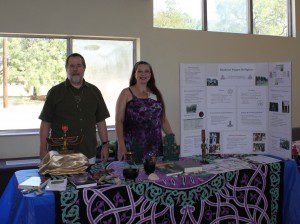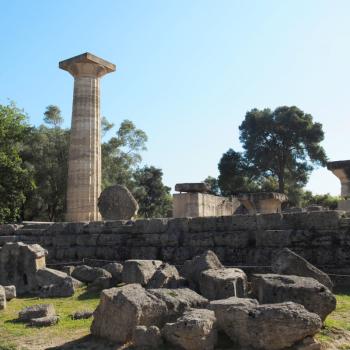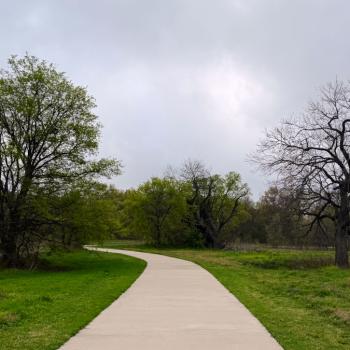
Cherry Hill Seminary Executive Director and fellow Patheos Pagan blogger Holli Emore is working in an interfaith group who has a goal to get their local city council to sign the Charter for Compassion. The Charter is “a cooperative effort to restore not only compassionate thinking but, more importantly, compassionate action to the center of religious, moral and political life.” As part of this effort, she’s asking Pagans for their theological basis for compassion. This is my attempt at an answer.
The word “compassion” literally means “to suffer with.” The Merriam-Webster online dictionary defines it as “sympathetic consciousness of others’ distress together with a desire to alleviate it.” The Charter for Compassion says:
The principle of compassion lies at the heart of all religious, ethical and spiritual traditions, calling us always to treat all others as we wish to be treated ourselves. Compassion impels us to work tirelessly to alleviate the suffering of our fellow creatures, to dethrone ourselves from the centre of our world and put another there, and to honour the inviolable sanctity of every single human being, treating everybody, without exception, with absolute justice, equity and respect.
We can debate whether or not compassion really lies at the heart of all religions. I’m not sure how useful that debate would be. But whether it does or it doesn’t, I would argue that it should.
My theological basis for compassion is a religious basis, but it is also a naturalistic basis. Intuitively, we feel an obligation to help those who help us, first of all the families who give us life and who support us when we are young and vulnerable. We feel an obligation to help our close relatives, our neighbors, and our families of choice. We are social animals and we know we cannot survive alone – we need the help of others, and they need our help.
But beyond the practical aspects of compassion lies the recognition of kinship, of looking into the face of another and seeing ourselves. That person is like me, therefore she feels pain and joy just as I do, therefore I should help her feel joy and prevent her from feeling pain.
We don’t automatically see everyone in that light, though. As I discussed in the last post on uncertainty, we have millions of years of practice at binary thinking, which includes assuming people we don’t know may want to hurt us.
This is where it is helpful to allow modern science to inform our religions. We now know – literally, not just mythically – we are all related. Modern humans evolved once, in East Africa, coming into our current form around 200,000 years ago. Some of us have a common ancestor more recently than others, but trace your ancestry back far enough and you’ll find common roots with everyone.
Keep going farther backward and you’ll find common ancestors with other primates, other mammals, other animals, and eventually with every living thing on Earth.
We are all related to each other. Equipped with that knowledge, we have no excuse for treating each other as anything less than kin.
Now, what of the Charter for Compassion? It challenges us “to refrain consistently and empathically from inflicting pain” and tells us that “to incite hatred by denigrating others—even our enemies—is a denial of our common humanity.” It is one thing to protect yourself by actively resisting someone who is trying to harm you. It is quite another to dehumanize such people and to rationalize actions that unnecessarily harm them and that dehumanize yourself.
In its third paragraph, the Charter states:
“Any interpretation of scripture that breeds violence, hatred or disdain is illegitimate.” As Pagans who reject the authority of anyone’s scripture, we should wholeheartedly support this idea.
We should “ensure that youth are given accurate and respectful information about other traditions, religions and cultures.” As people whose religions are often mischaracterized, sometimes out of ignorance and sometimes out of malice, I think we can wholeheartedly support this too.
We should “encourage a positive appreciation of cultural and religious diversity.” We’re having some issues of our own here as we try to figure out the proper relationship between polytheistic Pagans and humanistic Pagans, and between other groups and traditions under the Big Tent of Paganism. We could take a good hint from the Charter here.
Where we may differ is in the fourth paragraph of the Charter. It says:
Rooted in a principled determination to transcend selfishness, compassion can break down political, dogmatic, ideological and religious boundaries.
This line is true – a commitment to compassion can break down barriers. Can. But the mere existence of the Charter won’t break down anything. What will break down barriers is a sustained commitment by all of us to live more compassionately – to see ourselves in others and to treat them with the dignity and respect due our relatives.
I applaud Holli and her interfaith group for bringing the Charter for Compassion to the attention of their city council. I hope the council signs it. If nothing else, such an act will raise the awareness of their city for a day or two. But until people think deeply about what compassion really means and choose to act on those thoughts, we won’t make much progress.
Increasing the level of compassion in the world? That’s the job of each and every one of us: to understand it, to practice it, and to show it to the world.

















